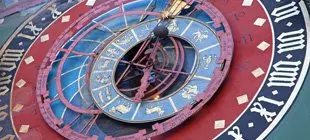The origins of astrology go back to the dawn of time. However, throughout its evolution, we find key personalities who have contributed a great deal to this science over the centuries. We would wager that this is a cycle that will gather momentum and could lead us to scientific discoveries that will be able to establish certain realities already noted with even greater conviction. Here are just some of the personalities who have helped astrology evolve up to the present day.

The astrology of the Chaldeans underwent great changes in ancient Greece by breaking away from religion and developing its own wealth of symbolism. Its freedom of thought compared with religious dogma made it closer to a more mathematical vision of the universe. Astrology acquired an identity of its own and became successful in its own right. This became the base for traditional astrology, which connects the psychology of the individual with the universe.
Ptolemy, who was born around 90 A.D., wrote "Tetrabiblos", considered to be the bible of astrology, and this had a great influence on the study of the stars. It deals with seven planets, Uranus, Neptune and Pluto not having been discovered at the time. Ptolemy thought of astrology as a form of medicine, which varied according to the horoscope of each individual. This also included factors such as the potential influence of parents, country and upbringing on a person, as well as the position of the planets in his or her astrological chart.
Plato, born in 429 0r 430 B.C., established the concept that each body, whether earthly or celestial, forms a part of the universal soul. According to his doctrine, which had a powerful influence on astrology, the planets are living beings, the world itself is an animal and its spherical shape is the symbol of perfection. The secularisation of astrology removed the religious angle to make it into a science in all aspects. However, despite these developments, it was to retain its consecrated side, which survives in Greek culture. Since this period, the characteristics of the planets have been identical to those of the gods of Mount Olympus.
Nostradamus, who was born in 1503, developed astrology in conjunction with Renaissance medicine in the western world. More is known about Michel de Nostradamus' famous "Centuries" or predictions than his astrological discoveries. In his view, astrology added mathematical support to the inspiration of a medium. As astrologer at the court of King Charles IX, he worked with the phases of the moon, the seasons (the equinoxes and solstices) and eclipses. It was Nostradamus who first described the phases of the lunar month and interpreted the planetary aspects he noted in the ephemerides he used, those of Carellus, Moletius, Leowitz, Simus and Stadius.
Modern Astrology
Astrology became more democratic at the beginning of the twentieth century. The great names in astrology published works which popularised it in the sense that its workings were described in words simpler to understand and it became more widely accessible to the general population. Other astrologers took over to spread the word among the greater public. Throughout its evolution, we find key personalities who have contributed much to this science up to the present time. We can wager that this cycle will gather momentum and maybe lead to scientific discoveries able to establish certainly realities already noted with even greater conviction. Here are some of these personalities, who have advanced the cause of astrology up until the present day.
André Barbault: This impassioned astrologer was born in 1921 and was a practitioner involved in trying to clarify astrology and constantly trying to shed some light on its intricacies. He has published around forty works with his own particular mode of expression, setting him apart from conventional astrological output, with an absence of clichés or repetition and an ability to open up the doors of the human psyche in parallel with the notion of destiny. He was the inventor of the theory of the planetary concentration index, measuring the distances between the planets of the Solar System. This to him is the key to global astrology, representing the distribution factor of the planets around the Sun.
Michel Gauquelin: This astrologer was born in 1928 and carried out statistical studies demonstrating the validity of certain astrological foundations. According to his works, the character and direction of each person's destiny is indisputable, as proven by a radical scientific methodology. His work is similar to that of Kepler, in the sense that they both tried to establish a correlation between the orbit of the planets, the composition of musical scales and the five Platonic solids. Gauquelin provides statistics relating to the births of thousands of individuals, classed according to socio-professional category, indisputably highlighting the influence of the stars on the celestial angles (First, Fourth, Seventh and Tenth Houses) of each one.
Catherine Aubier: Catherine Aubier is an astrologer who has specialised in astrological psychology and the astrology of relationships (synastry). She is the one in this area who has made astrology completely democratic from a relationship angle, through the distribution of her works and the four works she has published, selling millions of copies. Her work for various organisations has enabled astrological research to progress and she has established clear and concise links between astrology and psychology. Her active participation in the creation of astrological software has played an even bigger part in the movement to make astrology available to all, to give us a better knowledge of not only the future but also our own psyche.
Rob Brezsny: Astrologer Rob Brezsny has adopted a completely atypical approach by referring in his horoscopes to works of literature or the cinema, enabling his readers to grasp a vast concept in a small number of words. This is what Nostradamus also did in his time, with cultural references from his era in his "Centuries", but these were not accessible to everyone. Rob Brezsny has the added ability of knowing how to adapt his language to individual cultural backgrounds, especially in the western world. The poetical turn of phrase of his horoscopes enables him to get his most highly important messages across smoothly in a way which is light-hearted and accessible to all. His determination not to depress his readers, whilst remaining true to the planetary transits he refers to, is quite remarkable and contrasts considerably with most modern astrologers, who are capable of making very sombre or pessimistic interpretations, which do not offer any way out from this kind of prediction. His receptivity to the world and other beings give him a freedom and light-hearted tone that many would like to emulate.






